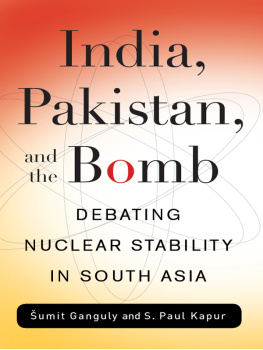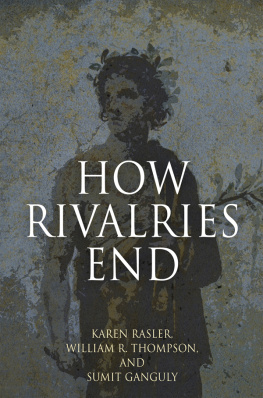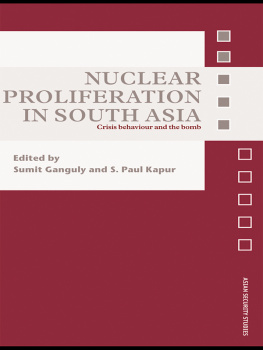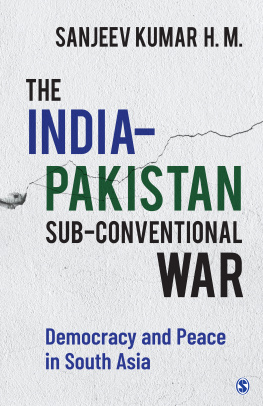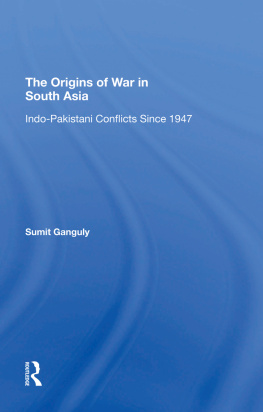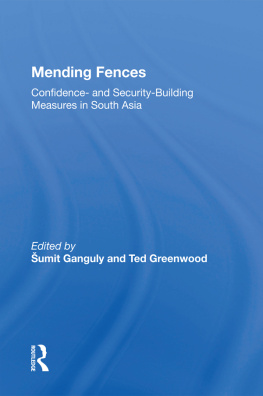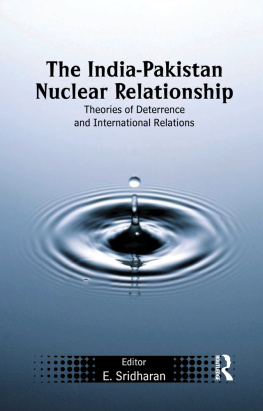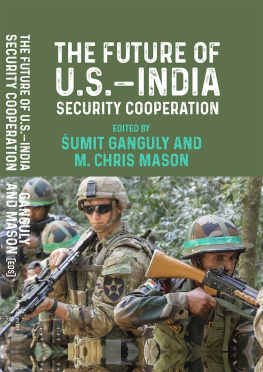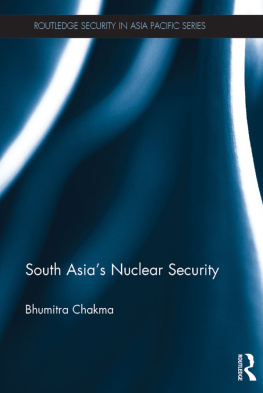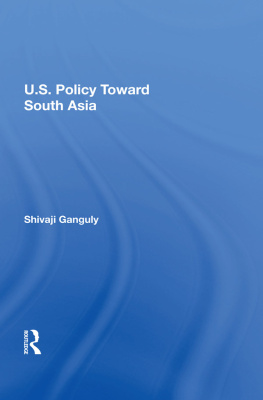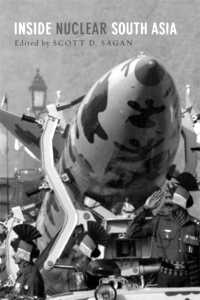Ganguly Sumit - India, Pakistan, and the Bomb: Debating Nuclear Stability in South Asia
Here you can read online Ganguly Sumit - India, Pakistan, and the Bomb: Debating Nuclear Stability in South Asia full text of the book (entire story) in english for free. Download pdf and epub, get meaning, cover and reviews about this ebook. year: 2010;2011, publisher: Columbia University Press, genre: Politics. Description of the work, (preface) as well as reviews are available. Best literature library LitArk.com created for fans of good reading and offers a wide selection of genres:
Romance novel
Science fiction
Adventure
Detective
Science
History
Home and family
Prose
Art
Politics
Computer
Non-fiction
Religion
Business
Children
Humor
Choose a favorite category and find really read worthwhile books. Enjoy immersion in the world of imagination, feel the emotions of the characters or learn something new for yourself, make an fascinating discovery.
- Book:India, Pakistan, and the Bomb: Debating Nuclear Stability in South Asia
- Author:
- Publisher:Columbia University Press
- Genre:
- Year:2010;2011
- Rating:5 / 5
- Favourites:Add to favourites
- Your mark:
- 100
- 1
- 2
- 3
- 4
- 5
India, Pakistan, and the Bomb: Debating Nuclear Stability in South Asia: summary, description and annotation
We offer to read an annotation, description, summary or preface (depends on what the author of the book "India, Pakistan, and the Bomb: Debating Nuclear Stability in South Asia" wrote himself). If you haven't found the necessary information about the book — write in the comments, we will try to find it.
India, Pakistan, and the Bomb: Debating Nuclear Stability in South Asia — read online for free the complete book (whole text) full work
Below is the text of the book, divided by pages. System saving the place of the last page read, allows you to conveniently read the book "India, Pakistan, and the Bomb: Debating Nuclear Stability in South Asia" online for free, without having to search again every time where you left off. Put a bookmark, and you can go to the page where you finished reading at any time.
Font size:
Interval:
Bookmark:
The Power of the Internet in China: Citizen Activism Online, Guobin Yang, 2009
China and India: Prospects for Peace, Jonathan Holslag, 2010


Publishers Since 1893
New York Chichester, West Sussex
cup.columbia.edu
Copyright 2010 Columbia University Press
All rights reserved
E-ISBN 978-0-231-51282-4
Ganguly, umit.
India, Pakistan, and the bomb: debating nuclear stability in South Asia /
umit Ganguly and S. Paul Kapur.
p. cm. (Contemporary Asia in the world)
Includes bibliographical references and index.
ISBN 978-0-231-14374-5 (cloth: alk. paper) ISBN 978-0-231-51282-4 (ebook)
1. Nuclear arms controlIndia. 2. Nuclear arms controlPakistan. 3. Nuclear nonproliferationIndia. 4. Nuclear nonproliferationPakistan. 5. Security, InternationalIndia. 6. Security, InternationalPakistan. 7. IndianForeign relationsPakistan. 8. PakistanForeign relationsIndia. I. Kapur, S. Paul. II. Title. III. Series.
327.1'7470954dc22
CUP would be pleased to hear about your reading experience with this e-book at .
umit Ganguly


| ballistic missile defense | BMD |
| Bharatiya Janata Party | BJP |
| Federally Administered Tribal Areas | FATA |
| gross domestic product | GDP |
| Indian Air Force | IAF |
| integrated battle groups | IBGs |
| Jaish-e-Mohammed | JeM |
| Jammu and Kashmir | J&K |
| Lashkar-e-Toiba | LeT |
| line of control | LOC |
| Northwest Frontier Province | NWFP |
| peaceful nuclear explosion | PNE |
| Students Islamic Movement of India | SIMI |
| Subterranean Nuclear Explosions Project | SNEP |
| Treaty on the Non-Proliferation of Nuclear Weapons | NPT |
Font size:
Interval:
Bookmark:
Similar books «India, Pakistan, and the Bomb: Debating Nuclear Stability in South Asia»
Look at similar books to India, Pakistan, and the Bomb: Debating Nuclear Stability in South Asia. We have selected literature similar in name and meaning in the hope of providing readers with more options to find new, interesting, not yet read works.
Discussion, reviews of the book India, Pakistan, and the Bomb: Debating Nuclear Stability in South Asia and just readers' own opinions. Leave your comments, write what you think about the work, its meaning or the main characters. Specify what exactly you liked and what you didn't like, and why you think so.

